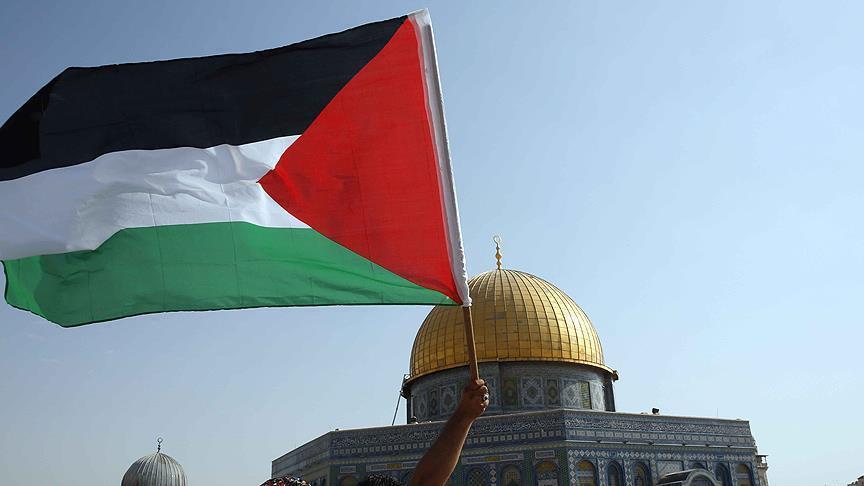Q: How do you see the process for the formation of an independent Palestinian state?
Formation of an independent Palestinian state under the 1993 Oslo Accords was supposed to take shape by 2005, but when Yasser Arafat, the former head of the Palestinian Authority, tried to implement the most important clause of the Oslo Accords, he was mysteriously assassinated in 2004. Arafat entered the occupied territories in 1994, one year after the signing of the Oslo Accords, and within 10 years used all the political means necessary to form an independent Palestinian state with Bait-ul-Muqadas as its capital; but Arafat has been besieged and poisoned in Ramallah, the headquarters of the Palestinian Authority, since 2002 upon the order of the then Israeli Prime Minister Ariel Sharon, and died in a Paris hospital in 2004. At the same time, French doctors detected the presence of a dangerous toxic substance made of plutonium in the blood of Yasser Arafat. In less than a month, the substance destroyed all the red blood cells of the former head of the PA. Since then, the leaders of the Palestinian Authority have not been able to pave the way for the formation of an independent Palestinian state under the terms of the Oslo Accords for fear of possible biological assassination.
Saeb Erekat, a senior Palestinian negotiator who treaded the path of Arafat, was biologically assassinated in a mysterious way and died last year, so the possibility of a legitimate Palestinian government is currently weak due to the lack of diplomatic tools and normalization of Arab-Israeli relations and the only solution is to strengthen the axis of resistance and confrontation appropriately, which is pursued by Hamas and the Islamic Jihad.
Q: On the basis of which principles of international law can the principle of determining the Palestinian right to self-determination be followed and applied?
The principle of the right to self-determination is enshrined in Article 1 of the Charter of the United Nations as a natural right of all nations. The independence of Algeria in 1962 and the independence of many African and Latin American countries was based on the same principle; however, due to the influence of the Zionist lobby in international institutions, including the United Nations, the issue of the Palestinian people’s right to self-determination has not been possible. In addition, regional institutions such as the Arab League and the Organization of Islamic Cooperation lack the will and power to help the Palestinian people. On the other hand, the Zionist regime is not willing under any circumstances to accept that the Palestinian people will achieve their right to an independent state. Israeli officials from the time of Prime Minister David Ben-Gurion to the current Prime Minister Naftali Bennett consider the formation of an independent Palestinian state in the 1967 occupied territories to be Israel’s death, and rely on US and Western support to block a referendum in the occupied territories. .
He added: Because of the heavy political cost, none of the US presidents will allow themselves to take action to form an independent Palestinian state. For example, Bill Clinton was the Democratic president of the United States. In a private meeting with former Palestinian Authority President Yasser Arafat in 1997, Bill Clinton secretly told him that he would not leave the White House unless he established an independent Palestinian state for the Palestinian people. The Mossad, which overheard talks between Bill Clinton and Yasser Arafat, and with the help of Zionist lobbyists in the White House, staged a moral scandal for Bill Clinton through White House staffer Monica Lewinsky, which got to the point where the US Congress intended to oust Clinton. Since then, Bill Clinton has never spoken about the formation of a Palestinian state. At the same time, the Mossad had infiltrated the White House and tapped a listening device into the chair of Bill Clinton in his office because Israel and the Zionist lobby were very sensitive about his emotions towards the Palestinian people.
Q: What are the internal and external obstacles to the formation of an independent Palestinian state?
Obstacles to the formation of an independent Palestinian state can be analyzed in three areas: international, regional and domestic. Internationally, all US presidents are committed to ensuring the security of the Zionist regime. Although there is a difference in behavior and speech between the Democratic and the Republican presidents, in the end all US presidents are subject to the will of the Zionist lobby, and any president who takes practical action to help the Palestinian people will face the fate of Bill Clinton. In the regional arena, the Arab governments of the region, which sometimes seek to normalize relations with the Zionist regime, do not help the Palestinian people at all. Inside the occupied territories, too, the PA became a crippled, inactive, and passive entity, and after 26 years of negotiations with Israel, failed to implement even the terms of the Oslo Accords.










0 Comments